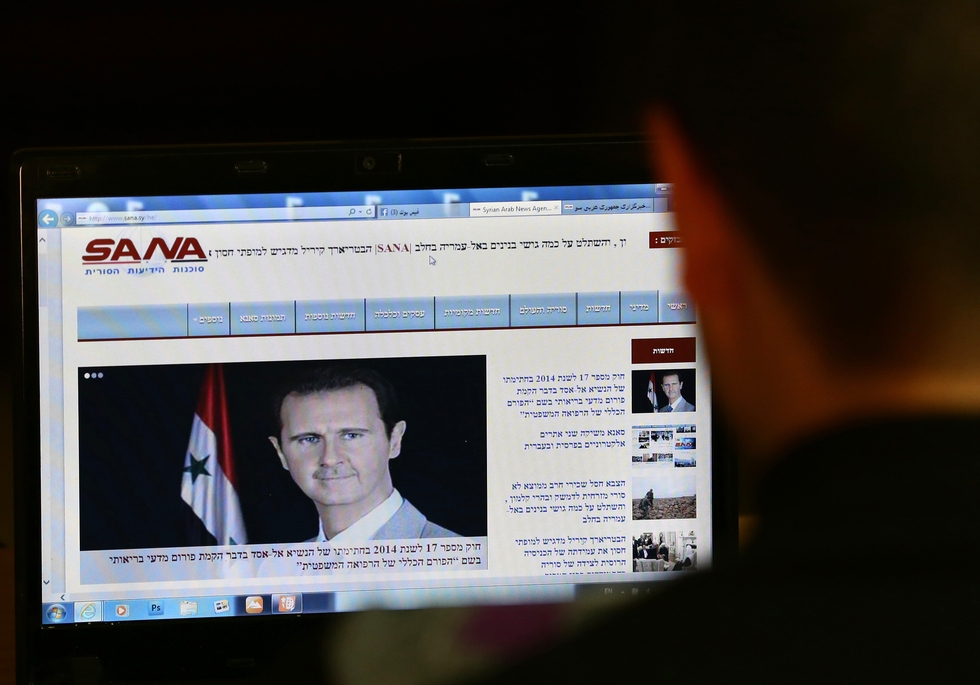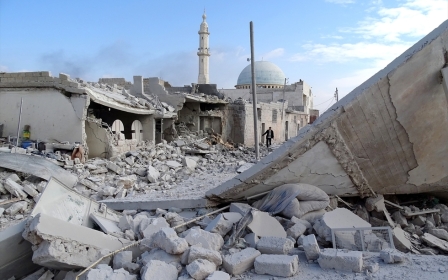Parallels between the Syrian and Israeli-Palestinian 'peace processes'

So far, nothing noteworthy has come out of the latest conference on Syria currently taking place in Geneva. That should come as no surprise, not just because of the specific parameters of the talks, but because they are a continuation of a redundant "peace process" that shares important parallels with its Israeli-Palestinian counterpart.
The framework for the Syrian "peace process" has remained largely the same since its launch in 2012. Despite its evident and predictable failures ever since, in Geneva and Vienna, the current conference in Switzerland represents an obstinate insistence on reinventing a wheel that never functioned. This has led to legitimate speculation about whether the process is designed to manage the conflict rather than solve it.
This is how the moribund Israeli-Palestinian "peace process" has long been viewed, given that it has stuck to the same failed formulae since it began a quarter of a century ago. Israel has used it as cover to further entrench its occupation and colonisation of Palestine, faithfully aided and abetted by the US, which is supposed to play broker between the two sides.
Regarding Syria, it is Russia actively propping up the regime via the slaughter and subjugation of Syrians while claiming to be a mediator in search of peace. In both cases, this duplicity has served to bolster their respective allies and shield them from criticism in a UN Security Council paralysed mainly by American and Russian veto power.
Syrians are experiencing what Palestinians have long endured: all process and no peace; talks for the sake of talks, not for the sake of a just and lasting solution to their plight. In both cases, it is about certain parties to these conflicts, and the international community at large, being seen to be doing something, regardless of the sincerity and efficacy of those efforts - in other words, PR and optics over substance.
End of Israeli occupation/Assad rule
When Palestinians say talks must lead to the end of Israel's occupation, or when Syrians say talks must lead to President Bashar al-Assad stepping down, they are derided as obstructionists for setting preconditions. However, negotiations must have a clearly defined end goal, otherwise they meander endlessly and provide ample time and opportunity to procrastinate, deceive and derail.
Israel and the Assad regime are the causes of their respective conflicts, no matter what one may think of the methods and groups involved in resisting them. What is the point of Palestinians negotiating if Israel will not commit to ending its occupation, or Syrians doing the same if Assad refuses to step down?
The belligerence of Israel and the Assad regime is borne out of a fundamental imbalance of power vis-a-vis their enemies, which renders talks meaningless without necessary pressure because the stronger party thus has no reason to seek a just - and hence viable - solution.
The Assad regime has destroyed the country, committed war crimes and crimes against humanity, and is responsible for the vast majority of the hundreds of thousands of civilian fatalities so far - all to maintain its brutal monopoly on power. Yet as with the entire Syrian "peace process", Assad's fate will not be discussed in Geneva.
"It is unacceptable that the whole Syrian crisis and the solution to the crisis have to be dependent on the fate of one man," UN Secretary-General Ban Ki-Moon said in December, as if a solution can be found that simply sweeps this central issue under the blood-stained carpet.
Instead, the first phase of the talks - which are supposed to last an entire six months - will focus only on achieving a ceasefire (which will exclude some of the most formidable ground forces), providing humanitarian aid and fighting the Islamic State. However, tackling any or all of these issues - which are effects of the conflict, not the cause - will not lead to a transition of power that is not even up for discussion, and hence will not bring peace to Syria.
Assad using Israeli tactics
On the contrary, the regime will continue to frame any opposition to it as terrorism, terrorist sympathy or foreign meddling, just as Israel does. Last week, Prime Minister Benjamin Netanyahu accused the UN secretary-general of "encouraging terror" for saying "it is human nature to react to occupation".
The Assad regime will continue to use talks as a platform to amplify its warped narrative, and ensure that they get bogged down on "security" issues rather than address the cause of the conflict and thus its solution - again, just as Israel does.
Both parties and their respective allies blame their opponents' disunity for the futility of negotiating because they lack a "partner for peace", yet they do all they can to maintain and exacerbate those divisions.
Israel has long fanned the flames of the rivalry between Hamas and the Palestinian Authority. Meanwhile, talks in Riyadh late last year that led to unprecedented diplomatic unity among Syrian opposition groups has been met by outside efforts to dictate which ones are allowed to participate in negotiations - a clear attempt to sow further division.
The Assad regime has taken a leaf right out of Israel's book of diversionary negotiating tactics. This is hardly surprising, because that book is very familiar, having been used effectively to maintain Israel's ongoing, half-century occupation of Syria's Golan Heights. How cruel that Syrians are once again the target of such tactics - this time by their own government.
- Sharif Nashashibi is an award-winning journalist and analyst on Arab affairs. He is a regular contributor to Al Arabiya News, Al Jazeera English, The National, and The Middle East magazine. In 2008, he received an award from the International Media Council "for both facilitating and producing consistently balanced reporting" on the Middle East.
The views expressed in this article belong to the author and do not necessarily reflect the editorial policy of Middle East Eye.
Photo: A man looks at Syrian government's official SANA news agency website in Hebrew, on 3 November, 2014 in Damascus (AFP).
New MEE newsletter: Jerusalem Dispatch
Sign up to get the latest insights and analysis on Israel-Palestine, alongside Turkey Unpacked and other MEE newsletters
Middle East Eye delivers independent and unrivalled coverage and analysis of the Middle East, North Africa and beyond. To learn more about republishing this content and the associated fees, please fill out this form. More about MEE can be found here.





